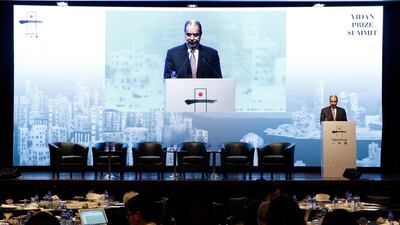Two women who have dedicated their lives to education research and development were awarded the inaugural HK$60 million (US$7.7 million) Yidan Prize at a lavish ceremony in Hong Kong on Sunday.
The winners, American Dr Carol S. Dweck and Colombian Vicky Colbert, each received a no-strings attached cash prize of US$1.9 million and another US$1.9 million each to support their respective education project or research.
Dr Dweck, an author and professor at Stanford University, was recognized with the Yidan Prize for Education Research for her influential study on the “growth mindset,” a term she coined to refer to her theory that intelligence is not fixed, but can grow and be developed through trial and error. Challenges and even failures are routes to learning and getting smarter, said Dr Dweck.
Mrs Colbert, founder and director of Fundación Escuela Nueva, has spent four decades working to improve the quality of education in rural public schools in Colombia. Her education model, which promotes independent, self-paced student learning with the teacher acting only as a “guide,” is being replicated in 14 countries. She was awarded the Yidan Prize for Education Development.
The Yidan Prize was launched last year by Chinese billionaire and tech entrepreneur-turned-philanthropist Charles Chen Yidan to celebrate and support two individuals annually who have made significant and sustainable contributions to education in one of two categories: research and development. Dr Chen is the co-founder of Tencent, an investment holding company that owns and develops leading digital games and communications platforms in China, including WeChat.
Dr Chen said the prize would be a platform to promote the best ideas in education that can be shared on an international scale to solve some of the most pressing issues facing schools. He acknowledged technology poses great challenges to modern education.
“It used to be the case that educational institutions were the most valuable mediums for storing and disseminating knowledge, but then the internet entered every household and, all of a sudden, knowledge became abundant and affordable,” said Dr Chen. “In the age of information overload, what is the social value of educational institutions? What meaning do they give and how much is a formal education worth?”
The evolution of science and technology is “exerting an unprecedented impact on social order,” he said.
“Much has been studied and discussed about the significant loss of jobs due to artificial intelligence -- most conclusions are certain of this revolutionary impact,” said Dr Chen. “What kind of educational programs will prepare people to overcome these challenges? How can we cooperate with while competing against machines? These questions demand serious rethinking.”
More than 350 business leaders, educators and policymakers gathered for the Yidan Summit Monday to tackle some of these issues in a series of discussions under the theme Education Redefined: The Future Is Now.”

